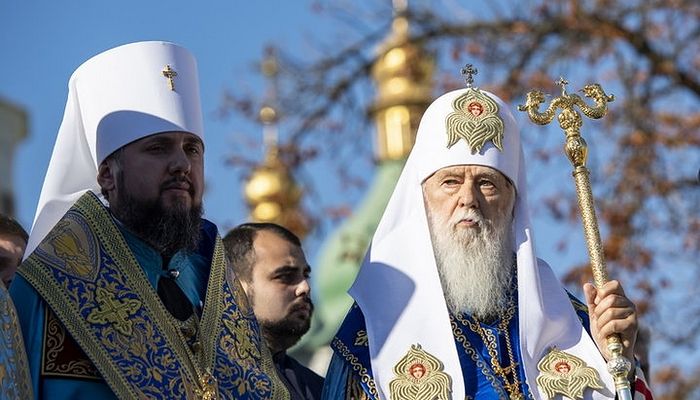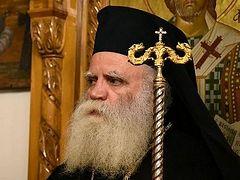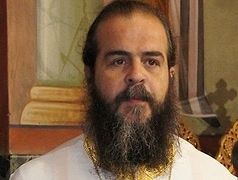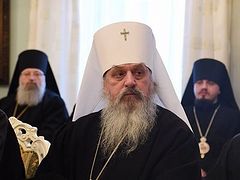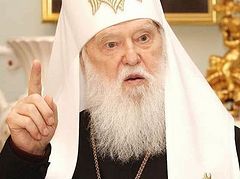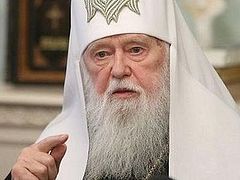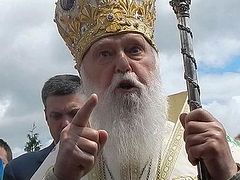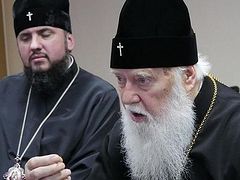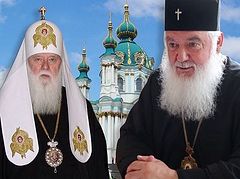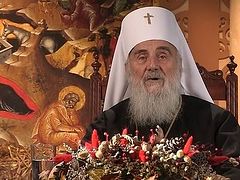Kiev, May 13, 2019
Ukrainian media has been reporting on trouble boiling under the surface of the schismatic “Orthodox Church of Ukraine” (OCU) for several weeks now. Factions have formed between those who support the official primate “Metropolitan” Epiphany Dumenko and those who remain loyal to and supportive of “Patriarch” Philaret Denisenko and are indignant at his minimal role in the new structure.
Denisenko has been the unrivaled leader of the schismatic autocephaly movement in Ukraine for 30 years but was relegated to the role of “Honorary Patriarch” in the OCU, forbidden to put his name in for primate by the Patriarchate of Constantinople which created the new church in cooperation with President Petro Poroshenko of Ukraine. The first Synod meeting for the new “church” gave him control of Kiev churches—a far cry from the primatial leadership he had imagined for himself.
Now the trouble has boiled over and Philaret has openly declared that he intends to restore the schismatic “Kiev Patriarchate” (KP) and take those hierarchs loyal to him with him. That is, the schismatic OCU, made up of two schismatic bodies, now faces the serious threaten of breaking down into two schismatic groups again.
Despite promising Constantinople that the KP was liquidated just before the “unification council” on December 15 that united the KP with the “Ukrainian Autocephalous Orthodox Church” (UAOC) to create the OCU, Philaret has since then continually declared that the KP still exists. He has given awards on behalf of the KP and parishes of the canonical Church that decided to go into schism were re-registered to the KP, not to the OCU.
He has also declared that the “unification council” was in no way a Ukrainian council, but was a function of the Constantinople Church.
It has become clear that Philaret kept the KP alive as Plan B in case he wasn’t satisfied with the new OCU, and he’s openly not.
“The Kiev Patriarchate exists, it does not need to be returned,” he said in a recent interview 1+1. “There is a patriarch, and if there is a patriarch, then there is a patriarchate, the Kiev Patriarchate. And there it does and should exist. And the time will come when it will be recognized. I am 100% certain,” he added.
He went on to acknowledge that there is a division in the “Ukrainian Church,” but said, “We are creating a single church—the Kiev Patriarchate. Necessarily.”
The Ministry of Culture of Ukraine, on the other hand, officially stated on May 10 that the KP no longer legally exists in Ukraine as of January 30. However, the evidence shows otherwise, as the KP (and the UAOC) remains active in the state register of legal entities, individual entrepreneurs and public formations. As mentioned above, the KP has continued to receive new parishes since January 30. Philaret has also declared that only he who created the KP can liquidate it.
Epiphany Dumenko was the protégé of Philaret Denisenko in the KP. Denisenko forced another KP “hierarch,” Mikhail Zinkevich, to remove his name from consideration for the primatial slot so his loyal project Dumenko could be elected. Denisenko assumed continued loyalty from Dumenko and even declared that he would continue to rule the church in tandem with the much younger Dumenko.
However, the frosting of their relationship became apparent when Denisenko recently invited a number of “hierarchs” of the OCU to join him at Kiev’s Vladimir Cathedral on May 14 to celebrate the memory of St. Makary of Kiev, whose relics are kept at the cathedral. The invitations were sent on behalf of the KP, and Dumenko was not among the invitees. It is widely expected that the revival of the KP will be discussed.
The Ternopil Diocese of the OCU, formerly the Ternopil Diocese of the UAOC, offered the clever response of expressing its support for Epiphany Dumenko in a letter published on UAOC letterhead.
Denisenko did eventually invite Dumenko, commenting to him that he had not initially invited him because “not once after your election as the primate of the UOC—for five months—did you celebrate the Divine Liturgy with me. I had the thought, perhaps it’s wrong, that you consider it humiliating to serve with Patriarch Philaret?”
The fact that Dumenko has not served with his mentor and “Honorary Patriarch” for five months indicates the growing sentiment among mainly the younger members of the KP that the future is not with Denisekno—it’s time to move on.
And Dumenko’s supporters are striking back. An appeal to the supporters of Philaret, “10 Theses for the Orthodox Church of Ukraine,” has appealed online, imploring them not to provoke a new schism. Additionally, the administration of the schismatic Kiev Theological Academy forbade its students from attending Philaret’s May 14 service for St. Makary.
The online appeal states: “Immediately after the unification council, strange processes incomprehensible to us began, which we connect with the unacceptable lust for power and ambition of some of the church hierarchs… First of all, we are talking about several interviews of the former Patriarch of the UOC-KP Philaret.”
The Orthodox world has long known that Philaret Denisenko went into schism in the first place 30 years ago after he was passed over for the Russian Patriarchal throne. As the Metropolitan of Kiev and Locum Tenens following the repose of Patriarch Pimen, Denisenko fully expected to ascend the throne, but in the aftermath of Alexei II’s election and enthronement, he betrayed Christ in His Church and became an ideologue of schismatic nationalism. He was defrocked, excommunicated, and eventually anathematized for persisting in schism.
On October 11, the Holy Synod of Constantinople declared the anathema against him null and void. Its spokesmen have justified the overturning of the anathema by claiming it was never justified in the first place. Moscow had simply taken revenge on Philaret for seeking Ukrainian autocephaly they claim—it had nothing to do with Philaret’s lust for power.
However, now that the Ukrainian schismatic church has autocephaly from Constantinople (though it is recognized only by Constantinople), there seems to be no justification for Philaret’s ongoing provocations, other than his egocentrism and lust for power that His Beatitude Archbishop Anastasios of Albania spoke of in a 2015 interview.
For his part, Epiphany Dumenko, who will not attend Philaret’s gathering, has responded that a return to the KP would mean the loss of the tomos of autocephaly from Constantinople and the isolation of the OCU. The OCU is, in fact, currently isolated from the rest of the Orthodox world, though Dumenko recently expressed the hope and belief that this will change.
The current state of the OCU is only a continuation of what has always been. Before the “unification council” in December, the “hierarchs” of the KP and UAOC could not work together and the Holy Synod of Constantinople was forced to write the statutes for the schismatic church and to convene the “council,” forcing a unification of incompatible groups.
Follow us on Facebook!

